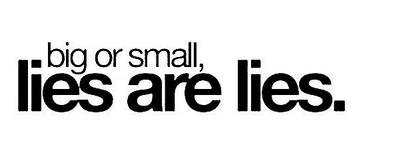I was once a compulsive liar and it is something that changed people’s perceptions about me. I am not a compulsive liar anymore, but I can tell when my parents, my sister, my friends, and even my doctors question whether what I tell them is true. Some of us struggle with our past and our mistakes and we have to face those mistakes but it brings me down knowing I lost friends and some family by doing something I ironically did so I could be alive.
Lying is a touchy subject because we are playing with people who may believe something is one way, and we tell them what they know is the truth as being wrong. We play with their mind, control their reactions, and actions as we sit there most likely feeling some excitement inside that our lie is believed. I want to say my lying was special but at the time I most likely could have dealt with my scary mood swings in another, possibly more responsible way.
As I began to work through these lies with my therapists I began to see that I had a purpose with what I chose to lie about, but to me it is a weird concept knowing that I truly did have a purpose with my lies. What would my life be like if my lies had continued? Is there any difference between me and a person who compulsively lies for most of their life and doesn’t get help? And what about a person who is addicted to lying?
Bipolar is dehumanizing, and for me my lying, even though it had a purpose of saving me from myself in one perspective, was also dehumanizing. That is the hard part about something like bipolar because just like lies, our actions can build up until we do not know who we are at a million different levels. We feel the need to sort out who we are, so like any sensible person we explore our world, tweaking it, and making ourselves comfortable in this black hole of the unknown by lying, by experimenting with drugs and alcohol, overworking ourselves, or treating others who love us as though they are play toys.
Our brain is supposed to work a certain way, and when someone is struggling with a mental health condition, many things present themselves as though we are stable, but we react to these things differently compared to a stable self. This means that something else (our brain) is making the decision to lie, to take drugs, or to participate in risky business. Of course there is a time where we are taking medications, and we have to challenge ourselves to battle what our brain has trained us to be comfortable with, but these things that many people accuse us of doing purposely are in fact pleas for help.
In college I was unknowingly sick and I socialized with people that I called friends both as myself and my “bipolar self” – myself with a twist. As my bipolar became more prominent I began to define myself as my bipolar self through lying to myself and to others. I had to lie to conform to the stigma that I believed to be true: that mental illness was proof I was weak thus confessing or asking for help was too embarrassing. The truth we all should think about is what someone else would do in our position. All I was trying to do was survive, and unfortunately I found survival in my lies.
The truth is that we are who we think we are. I am a loving, compassionate, studious, comical, and committed individual towards anything and everyone I know. My lies and early signs of bipolar may have painted a picture of an unworthy, inhuman individual but I do not deserve the application that I am a liar and that I will only be a liar. All I am is someone who wants to live a fulfilling and adventurous life like everyone else and bipolar to me is a challenge in my life that I simply have to deal with. As Helen Keller once said, “Life is either a daring adventure or nothing at all”. We all are living a daring adventure, and in doing so, through our mistakes and challenges that bipolar may present us, we are better individuals for putting up with it all.


